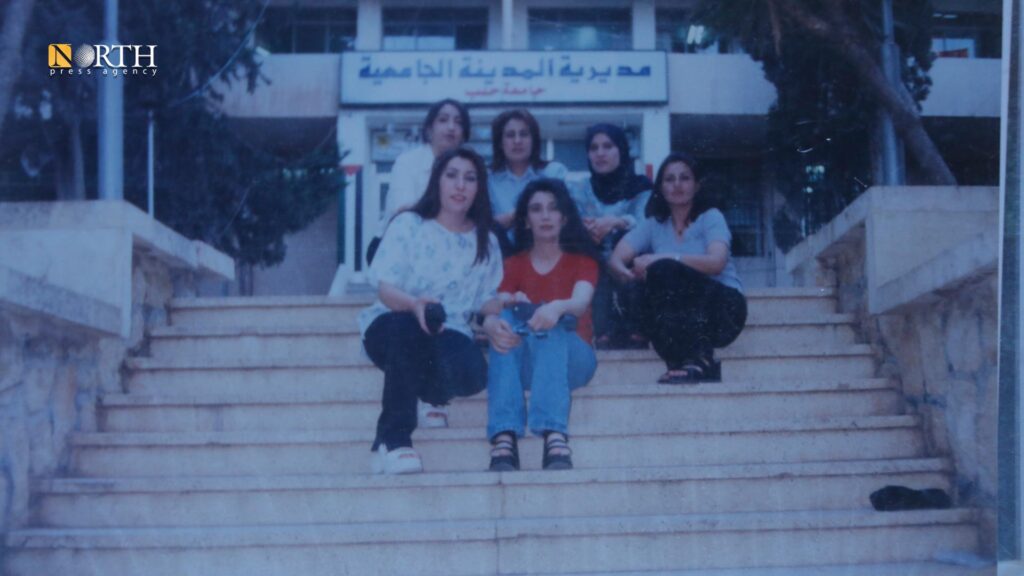QAMISHLI, Syria (North Press) – In a small room in the city of Amuda, west of Qamishli, northeast Syria, Nidal Ibrahim flipped through his wife’s college pictures. He looked at the French literature lectures and Kurdish language books and was overwhelmed by tears when he looked at Yusra Darwish’s photo, recently hung on the wall after she was killed by a Turkish drone days earlier.
On June 20th, the Autonomous Administration of North and East Syria (AANES) announced that a Turkish drone had targeted a vehicle carrying its officials in the countryside of the city of Qamishli, killing the co-chair of the Qamishli Region Council, Yusra Darwish; the Deputy Co-chair, Leyman Shouish; and their driver, Farat Toma; as well as injuring the other Co-chair, Gabi Shamoun, while they were visiting AANES institutions.
Ibrahim recounted life landmarks in his wife’s journey, wondering about the reason that made her a target for a Turkish drone, as she was a French and Kurdish teacher who did not attack the Turkish state.
Darwish, 53, from the city of Amuda, west of Qamishli, studied French literature at Aleppo University and taught the French language for many years until 2012. When Kurds formed an autonomous administration in Syria, she started teaching the Kurdish language and participated in establishing its institutions. She was responsible for the administration of the Kurdish schools of Amuda for years.
“We got married 15 years ago,” he told North Press, “My wife was a civilian working in social institutions that served the locals. She did not carry weapons and did not fight. Why are civilians so brutally attacked?”
Two years earlier, she worked as an administrator in the Amuda Region Council. Eight months ago, she was elected as the co-chair of the Qamishli Region Council, the administrative division system adopted by the AANES to provide services for the population in the region.
The AANES said Turkish attacks against civilians “aim at destabilizing the region and come in tandem with the AANES’s decision to start prosecuting foreign militants of Islamic State (ISIS).”
The AANES demanded the international community, the US, and Russia to put an end to these frequent Turkish attacks.
Ibrahim said his wife was popular in her community as she taught French and Kurdish languages to hundreds of students from Amuda. After she graduated from Aleppo University, Darwish was not assigned as a permanent teacher in schools at the time because she was Maktoum (an unregistered Syrian-born person) and did not have Syrian nationality, so she taught as a substitute teacher.
Maktoum persons are those who the Syrian government did not register in its census records or grant citizenship. They receive a Maktoum card but cannot be employed in a job, own property, or have any record in their name, even if they graduate from universities.
It is another exclusionary policy, such as the Arab Belt, a project of demographic change against the original Kurdish inhabitants of northern and northeastern Syria, dating back to the era of the former Syrian president Hafez al-Assad, father of the current president, Bashar, and the ruling party of Baath.
Recalling the day of the attack, Ibrahim said, crying, “It was the first time she left home without saying goodbye to me.”

“Where are human rights organizations? Nobody helps us. They stand with the powerful Turkish state. How and where can I press charges against the mercenary Erdogan,” he said.
Ibrahim wonders how his wife posed a threat to Turkish national security, as she did not throw a single stone at adjacent borders. “On the contrary, Turkish aircraft and artillery do not stop bombing us. Last year, they burned our wheat and livelihood. Turkey is attacking us with various means,” he added.
Hana Khaled, Darwish’s friend, and an official in the Administration of Amuda Schools, said she is shocked and cannot believe her friend, who she had worked with for many years in teaching the Kurdish language, has died.
“She [Darwis] was a teacher and administrator in the education sector and recently worked to serve her community. What was her fault to be targeted this way?” Khaled wondered.
she believes that Turkey aims to spread terror and fear among the population and destabilize the regions of northeastern Syria by targeting civilians.
Neither the US nor Russia, guarantors in the region, responded to Turkey’s targeting of Darwish and her companions. US State official Matthew Miller merely commented that they are “concerned” about the increased violence, and US National Security Adviser John Kirby said they “understand Turkish concerns.”

